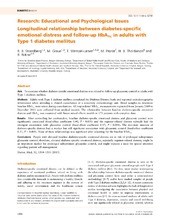| dc.contributor.author | Strandberg, Ragnhild Bjarkøy | en_US |
| dc.contributor.author | Graue, Marit | en_US |
| dc.contributor.author | Wentzel-Larsen, Tore | en_US |
| dc.contributor.author | Peyrot, Mark | en_US |
| dc.contributor.author | Thordarson, Hrafnkell B | en_US |
| dc.contributor.author | Rokne, Berit | en_US |
| dc.date.accessioned | 2016-01-04T10:22:54Z | |
| dc.date.available | 2016-01-04T10:22:54Z | |
| dc.date.issued | 2015-05-18 | |
| dc.Published | Diabetic Medicine 2015, 32(10):1304-1310 | eng |
| dc.identifier.issn | 0742-3071 | |
| dc.identifier.uri | https://hdl.handle.net/1956/10852 | |
| dc.description.abstract | Aim To examine whether diabetes-specific emotional distress was related to follow-up glycaemic control in adults with Type 1 diabetes mellitus. Methods Adults with Type 1 diabetes mellitus completed the Diabetes Distress Scale and reported sociodemographic information when attending a clinical consultation at a university endocrinology unit. Blood samples to determine baseline HbA1c were taken during consultations. All respondents' HbA1c measurements registered from January 2009 to December 2011 were collected from medical records. The relationship between baseline diabetes-specific emotional distress and HbA1c was examined with linear mixed-effects models in 175 patients with complete data. Results After controlling for confounders, baseline diabetes-specific emotional distress and glycaemic control were significantly associated (fixed-effect coefficient 0.40, P < 0.001) and the regimen-related distress subscale had the strongest association with glycaemic control (fixed-effect coefficient 0.47, P < 0.001). The two-item measure of diabetes-specific distress had a weaker but still significant association with glycaemic control (fixed-effect coefficient 0.31, P < 0.001). None of these relationships was significant after adjusting for the baseline HbA1c. Conclusions People with elevated baseline diabetes-specific emotional distress are at risk of prolonged suboptimum glycaemic control; therefore, elevated diabetes-specific emotional distress, especially regimen-related distress, might be an important marker for prolonged suboptimum glycaemic control, and might indicate a need for special attention regarding patient self-management. | en_US |
| dc.language.iso | eng | eng |
| dc.publisher | John Wiley & Sons Ltd. | eng |
| dc.rights | Attribution CC BY | eng |
| dc.rights.uri | http://creativecommons.org/licenses/by/4.0 | eng |
| dc.subject | Longitudinal relationship | eng |
| dc.subject | Type 1 diabetes mellitus | eng |
| dc.title | Longitudinal relationship between diabetes-specific emotional distress and follow-up HbA1c in adults with Type 1 diabetes mellitus | en_US |
| dc.type | Peer reviewed | |
| dc.type | Journal article | |
| dc.date.updated | 2015-12-21T20:16:30Z | |
| dc.description.version | publishedVersion | en_US |
| dc.rights.holder | Copyright 2015 The Authors | |
| dc.identifier.doi | https://doi.org/10.1111/dme.12781 | |
| dc.identifier.cristin | 1283966 | |
| dc.subject.nsi | VDP::Medisinske Fag: 700 | en_US |

